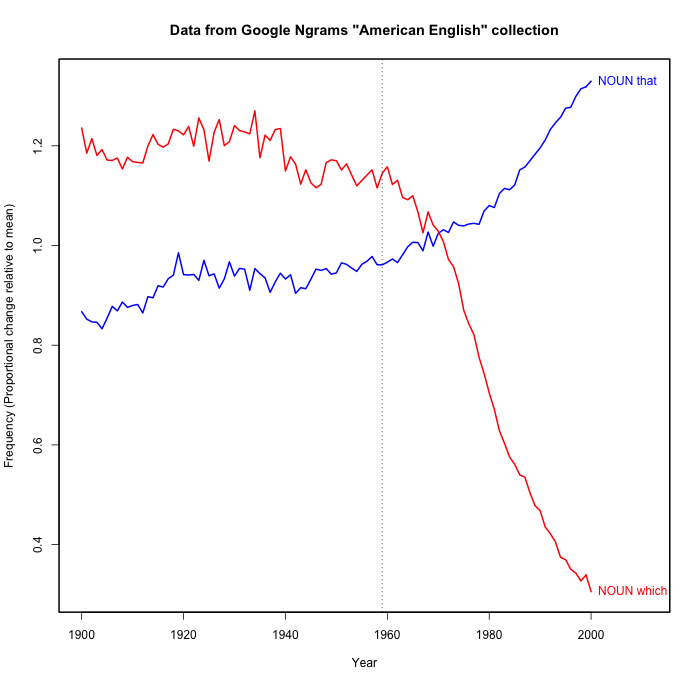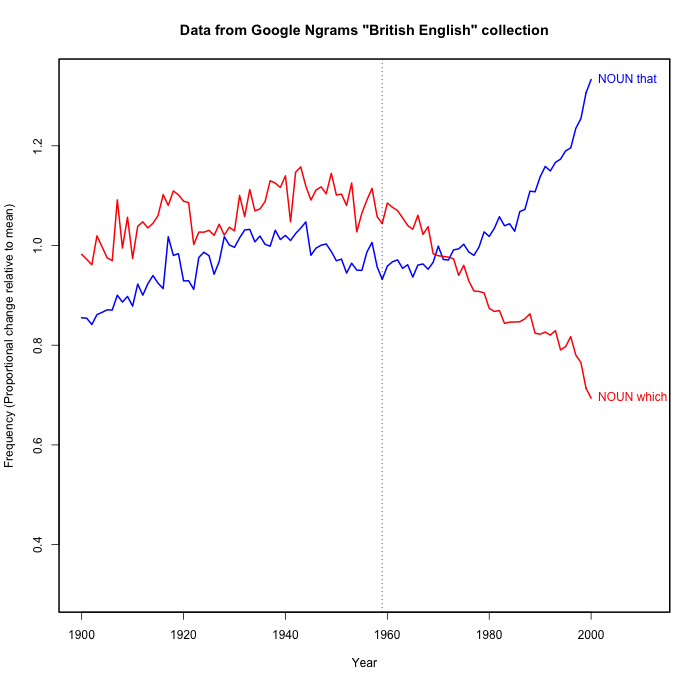December 24, 2015 @ 8:54 am
· Filed by Mark Liberman under Language and culture
It's become our tradition to list the Posts of Christmas Past:
2003 "'Twas the night before Christmas", "Same-sex Mrs. Santa: 'The semantics are confusing'"
2004: "Talking animals: miracle or curse?", "A boxing day election — or not?"
2005: "Christmas trees and holiday trees";
2006: "Merry … umm … Christmas, Will!", "Like, a Christmas gift card", "Happy tensing and coal in sex";
2007: "One Christmas too long", "Christmas and 'politically correct(ed)ness'", "'Tis the season", "The unkindness of strangers", "Victims and etymology", "Lexical repulsion", "Insert flap 'A' and throw away";
2008: "Seven fishes", "Happy Christmas";
2009: "No, Virginia";
2010: "Mele Kalikimaka";
2011: "Seasonal linguistic pun", "Calling Christmas Christmas";
2013: "Watch out for those talking animals tonight", "Reindeer talk";
2014: "Magi, myrrh, and mummies"
Permalink
December 23, 2015 @ 7:30 am
· Filed by Geoffrey K. Pullum under Errors, Language and the media, Prescriptivist poppycock, Silliness, Usage advice, Writing
There is a designated staff member whose job at The Economist is to make the magazine (my favorite magazine) look ridiculous by moving adverbs to unacceptably silly positions in the sentence. She is still at work. This is from the December 12 issue, p. 58, in an article about preparations for a referendum next year on whether Britain should abandon its membership in the European Union:
Most pollsters reckon a later vote is likely to boost the leave campaign. Avoidance of delay was a big reason why the government this week pressed the House of Commons swiftly to overturn a House of Lords plan to extend the referendum franchise to 16- and 17-year-olds.
Read the rest of this entry »
Permalink
December 22, 2015 @ 11:54 am
· Filed by Mark Liberman under Usage
Philip B. Corbett, "Me and Myself", NYT 12/22/2015:
Several readers have lamented a tendency, in The Times and elsewhere, for writers to misuse so-called reflexive pronouns — the ones that end in “-self” or “-selves.”
Read the rest of this entry »
Permalink
December 22, 2015 @ 6:56 am
· Filed by Victor Mair under Typography, Writing systems
I would like to call the attention of Language Log readers to an extraordinary article by Nikhil Sonnad:
"The long, incredibly tortuous, and fascinating process of creating a Chinese font " (Quartz, 12/18/15)
I knew that Nikhil was writing this article, because I helped him with the part about the historical development of the script over a month ago. After that I didn't hear anything from him until yesterday when he sent me notice that the article had just been published. Now that I've had a chance to read Nikhil's article, I must say that it a unique and amazing accomplishment.
Read the rest of this entry »
Permalink
December 21, 2015 @ 9:52 pm
· Filed by Victor Mair under Language change, Names
[The first part of this post is from an anonymous contributor.]
The Serbian legation in London complains to the media about the spelling Servia, which is 'highly offensive to our people'.
(It is true that there is a place in Greece called 'Servia', whose name 'derives from the Latin verb servo, meaning "to watch over"'.)
Read the rest of this entry »
Permalink
December 21, 2015 @ 3:28 pm
· Filed by Mark Liberman under Humor
"Trial set of Johnny Depp dog case in Australia", AFP 12/15/2015:
Johnny Depp's wife Amber Heard will face trial in Australia in April for allegedly smuggling two dogs into the country in a case dubbed the "war on terrier", a court ruled Tuesday.
Heard is facing two counts of knowingly importing a prohibited product in breach of the Quarantine Act.
Read the rest of this entry »
Permalink
December 21, 2015 @ 8:12 am
· Filed by Mark Liberman under Computational linguistics, Language and culture, The language of science
Christiaan H Vinkers et al., "Use of positive and negative words in scientific PubMed abstracts between 1974 and 2014: retrospective analysis", BMJ 2015:
Design Retrospective analysis of all scientific abstracts in PubMed between 1974 and 2014.
Methods The yearly frequencies of positive, negative, and neutral words (25 preselected words in each category), plus 100 randomly selected words were normalised for the total number of abstracts. […]
Results The absolute frequency of positive words increased from 2.0% (1974-80) to 17.5% (2014), a relative increase of 880% over four decades.
Read the rest of this entry »
Permalink
December 20, 2015 @ 11:57 pm
· Filed by Victor Mair under Contests, Words words words
China Daily has published "Top 10 shortlist of Chinese character of the year announced" (12/17/15).
Since this is only the short list, I will not describe it in detail, but will wait till December 21 (tomorrow) for the the winner to be announced. For the moment, however, I'll just note that — after some years of confusion about the difference between a word and a character — China now seems to have settled on a clear division between Character of the Year and Word of the Year, so that they are running two contests simultaneously.
Read the rest of this entry »
Permalink
December 20, 2015 @ 12:52 pm
· Filed by Victor Mair under Lost in translation
Anne Henochowicz spotted this sign in the bathroom at Lombardi's, the first pizza shop in NYC:

Read the rest of this entry »
Permalink
December 20, 2015 @ 12:37 pm
· Filed by Victor Mair under Lost in translation
This was covered fairly well five years ago, but it has recently come alive again:

Read the rest of this entry »
Permalink
December 18, 2015 @ 9:21 am
· Filed by Victor Mair under Numbers, Writing systems
In "Remember the First 100 Digits of Pi Using This Basic Technique" (mental_floss, 12/11/15), Caitlin Schneider describes a "memory palace" in which one can use letters to recall long strings of numbers.
The
second commenter, Helvetica Baskin Robbins, describes a Japanese mnemonic system by means of which one can use numbers to recall sequences of numbers.
Read the rest of this entry »
Permalink
December 18, 2015 @ 8:45 am
· Filed by Mark Liberman under Linguistic history
In "A quantitative history of which-hunting", I reproduced a plot due to (an anonymous colleague of) Jonathan Owen, showing that texts from the last half of the 20th century saw a decrease in the relative frequency of NOUN which VERB, and an increase in the relative frequency of NOUN that VERB. Jonathan took this to indicate the success of (usage guides like) Strunk & White's The Elements of Style in persuading writers and copy-editors to avoid which in "restrictive" (AKA "defining" or "integrated") relative clauses
Here are some plots showing the effect, for data (without smoothing) from the Google Books ngram corpus. The "British English" dataset shows about the same increase in NOUN that as the "American English" collection does, but somewhat less decrease in NOUN which:
| American English |
British English |
 |
 |
Read the rest of this entry »
Permalink
December 17, 2015 @ 3:08 am
· Filed by Victor Mair under Pronunciation, Punctuation
I've heard people pronounce this symbol as though it were spelled "asteriks" or "asterix" (and some folks even write it the latter way). It gets really tricky when those who do so try to say it in the plural. And even those who pronounce "asterisk" the way it is spelled seem to have to make a special effort to render the final "s" of the plural audible when they say it.
Read the rest of this entry »
Permalink



